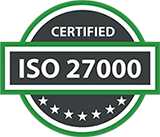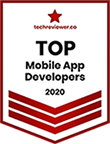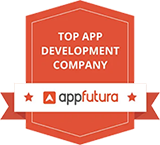Hire Dedicated WordPress Developers
Seamless integration with your system
Dedicated WordPress experts
Ongoing support after launch
Custom solutions for your needs
Scalable development
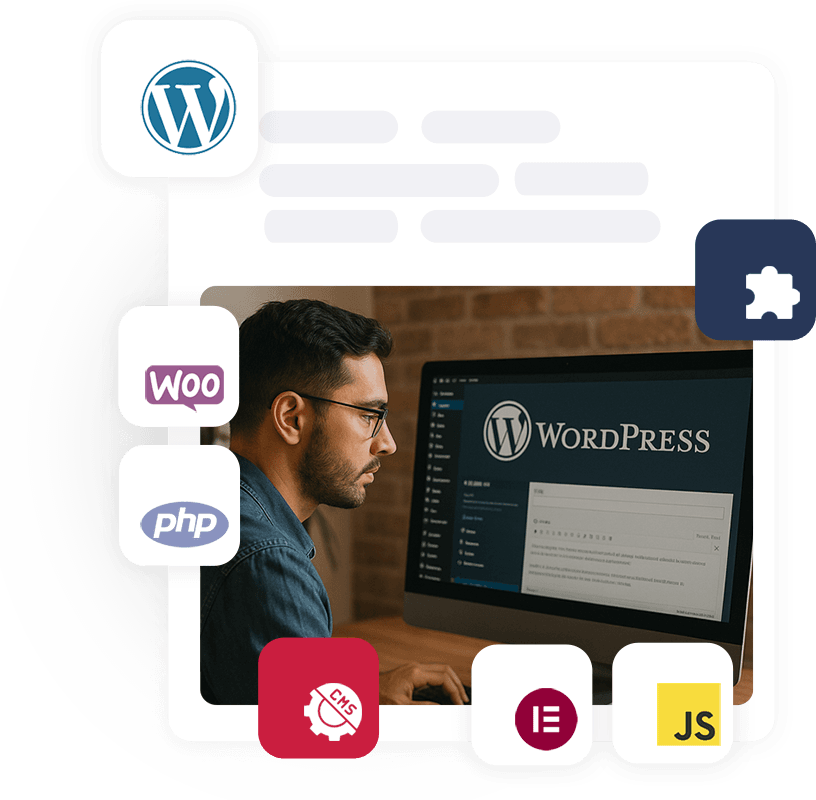
Tailored WordPress Solutions, Expert Developers, and Fast Delivery to Match Your Product Goals
Leverage the flexibility and robust architecture of WordPress CMS to build dynamic and engaging web experiences.
From interactive portfolios to complex e-commerce platforms, WordPress empowers you to create websites that captivate your audience and drive your online goals.
WordPress's adaptability makes it the ideal platform for a wide range of web projects.
Whether you're starting a simple blog to share your thoughts or developing a large-scale enterprise site to manage your business operations.
Hire WordPress Experts to Build Solutions for Your Specific Business Case.
Theme Customization & Integration
Get pixel-perfect themes that look and feel just right — responsive, fast, and user-centric.
Benefits of Hiring WordPress Developers
Seamless integration across themes and plugins.
Affordable WordPress solutions for every budget.
Rapid WordPress project execution.
Quick issue resolution and optimization.
Adaptable development to your changing needs.
Clear and effective communication channels.

Tech Stack Expertise of Our WordPress Developers
Our WordPress developers utilize the most effective tools, frameworks, and libraries to build functional, fast, and visually impactful websites.
 WordPress
WordPress Joomla
Joomla DotNetNuke
DotNetNuke Sitefinity
Sitefinity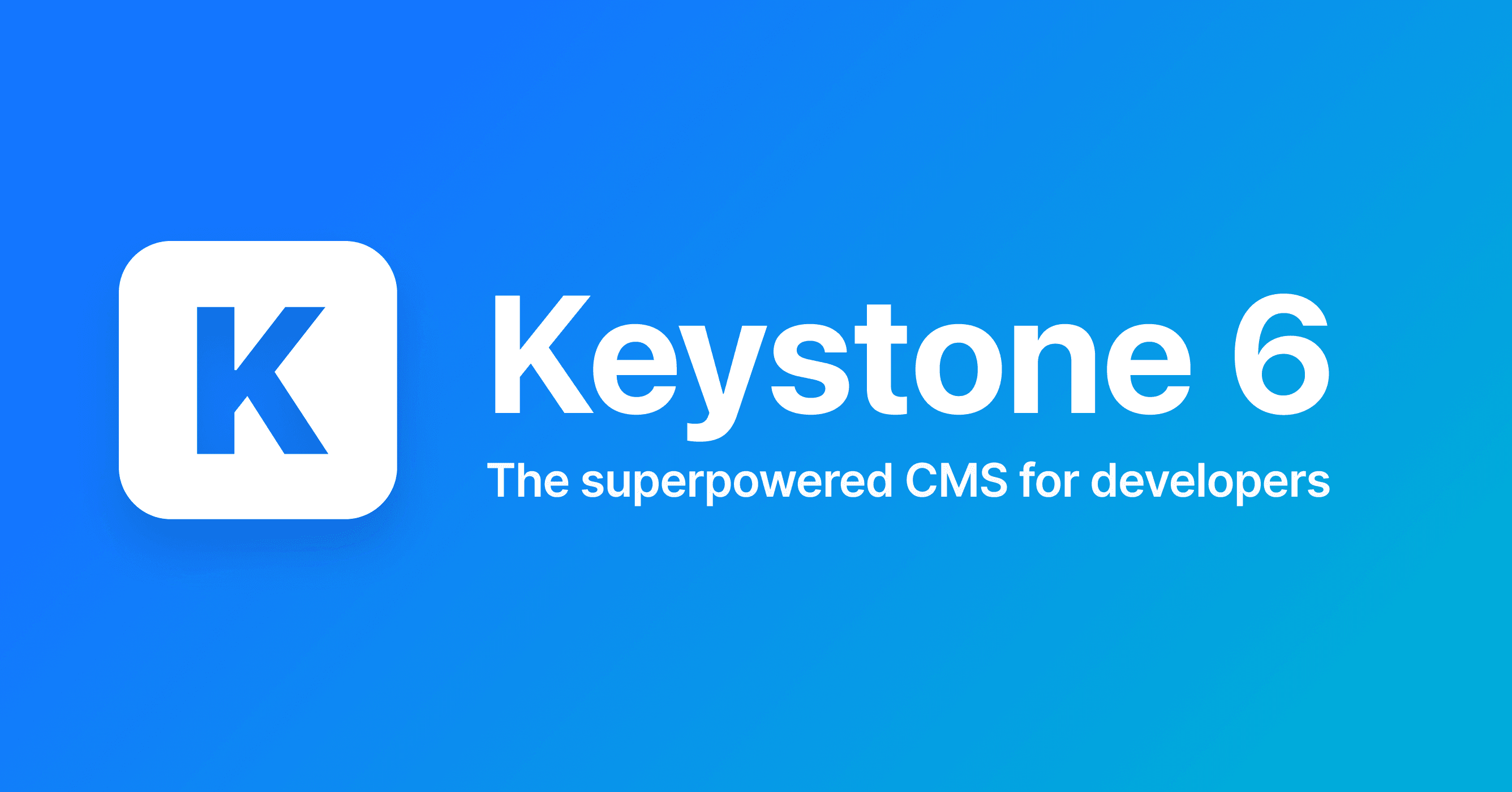 KeystoneJS
KeystoneJS
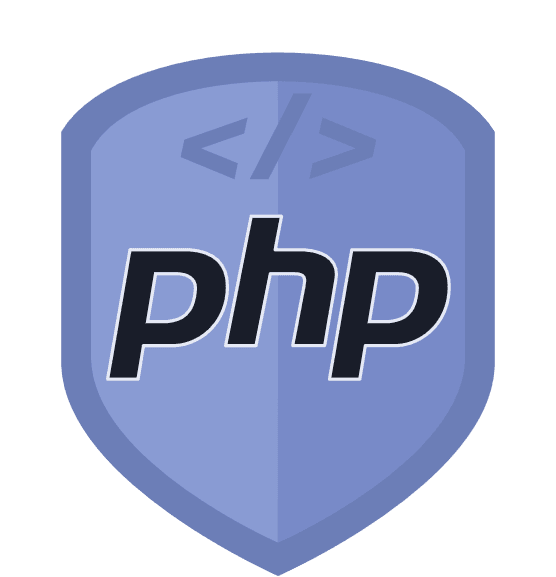 PHP
PHP .NET
.NET Node.js
Node.js Java
Java Python
Python Express
Express
 HTML5
HTML5 CSS3
CSS3 JavaScript
JavaScript AngularJS
AngularJS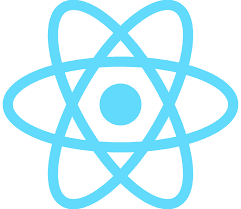 React.js
React.js Vue.js
Vue.js
Testimonials
The team delivered high-quality work that met our expectations in terms of design and functionality.
Why & Benefits
Join Dappinity to work at the forefront of digital innovation, collaborating with top-tier tech talent on meaningful projects for global clients. We offer a flexible, remote-friendly work environment, competitive compensation, and clear career growth opportunities. At Dappinity, you’ll enjoy continuous learning, mentorship, and recognition in a collaborative, inclusive culture that values creativity, impact, and professional development. Elevate your career while shaping future-ready solutions with us.
Why Hire WordPress Developers from Dappinity?
Dappinity provides expert WordPress Developers offering scalable, innovative, and client-focused solutions while ensuring high quality and timely project delivery.
- Expert Developers
- Agile Project Management
- Cost Effective Solutions
- Superior Software Quality
- Optimized Operational Costs
- Time Zone Compatibility
Benefits of Dedicated WordPress Developers
The dedicated WordPress Developers team at Dappinity delivers innovative, scalable, and secure solutions, ensuring seamless collaboration and future ready applications.
- Tailored Software Solutions
- Cutting Edge Technology
- Agile Development Process
- Seamless Collaboration
- Future Ready Applications
- End to End Support
Hire WordPress Developers Fast with Our Simple Process

Tell us what you need - tech stack, experience, timelines.

We send you pre-screened developers matched to your needs.

You interview. You decide. Start in as little as 72 hours.

Easily scale up or down. We stay flexible as you grow.
1Engagement Models (Full-time, Part-time, Hourly, Project-Based)
When hiring WordPress developers, choosing the right engagement model is essential to match your project’s scope, timeline, and budget. Here’s a breakdown of different engagement models for WordPress development:
Full-time Developers:
Full-time WordPress developers are ideal for large-scale, long-term projects like building complex websites, e-commerce platforms, or custom WordPress themes and plugins. They provide continuous development, ensuring consistency and progress throughout the project.
Part-time Developers:
Part-time WordPress developers are great for maintaining your website, adding new features, or fixing minor bugs. This model suits businesses that need ongoing support but don’t require a full-time developer. It’s cost-effective for tasks like content management or implementing small updates.
Hourly Developers:
Hourly developers are a flexible option when you need short-term assistance. They are perfect for tasks like optimizing website speed, fixing bugs, or making small design adjustments. With this model, you can get help for specific needs without a long-term commitment.
Project-Based Developers:
Project-based WordPress developers are ideal for well-defined projects with clear deliverables, such as developing a custom WordPress theme, building a complex plugin, or setting up an e-commerce store using WooCommerce. This model is great when you want to set a timeline and budget for a specific project.
2Development Methodologies: Best for WordPress Projects
Selecting the right development methodology helps ensure that your WordPress project is delivered on time, within budget, and meets your expectations. Here’s how different methodologies align with WordPress development:
Agile:
Agile is ideal for WordPress projects where requirements evolve frequently or the scope is dynamic. This methodology allows for incremental progress, meaning new features or changes are continuously implemented. It works well for custom website development, content updates, or adding new functionality.
Scrum:
Scrum is suitable for larger WordPress projects with multiple team members. By breaking the project into smaller, manageable sprints, Scrum helps developers focus on specific tasks, such as theme customization, plugin integration, or optimizing performance. Scrum ensures that progress is made in manageable chunks.
Waterfall:
Waterfall is a more structured approach and works well for smaller WordPress projects with clear, fixed requirements. If you’re building a simple website or blog with little to no changes in scope, the waterfall approach may be appropriate. It follows a step-by-step process, ensuring clear timelines and deliverables.
3Matching Tech Stack Needs with WordPress Expertise
WordPress developers are skilled in a variety of technologies to enhance the functionality and performance of WordPress websites. Here’s how WordPress fits within the modern tech ecosystem:
Core Technologies:
- PHP: The primary server-side scripting language for WordPress. WordPress developers use PHP to create custom themes, plugins, and ensure the server-side functionality of your website.
- MySQL: WordPress uses MySQL databases to store and retrieve data like posts, pages, and user information. Developers need to be proficient in MySQL to optimize database queries for better performance.
- HTML/CSS: WordPress developers need solid HTML and CSS skills for creating responsive, user-friendly designs. Customizing themes and ensuring compatibility across different devices and browsers is key.
- JavaScript/jQuery: JavaScript, often with jQuery, enhances interactivity and dynamic content in WordPress themes. It’s crucial for building features like sliders, pop-ups, and form validation.
Frontend Technologies:
- WordPress Themes: WordPress developers build themes to control the website’s design and layout. Developers are skilled in creating custom themes that reflect the business's brand and provide a unique user experience.
- Responsive Design: WordPress developers ensure that themes are responsive, meaning they automatically adjust to different screen sizes and devices, such as smartphones and tablets.
Backend Integration:
- Plugins: Plugins are an integral part of WordPress. Developers install and configure plugins to add functionality to the website, such as SEO optimization, contact forms, or e-commerce capabilities. Developers also create custom plugins when needed.
- WooCommerce: For e-commerce websites, WordPress developers use WooCommerce, a powerful plugin that turns your WordPress site into an online store. Developers are skilled in customizing WooCommerce for specific business needs.
Security:
Secure Login & User Management: WordPress developers follow best practices to ensure the security of user data and prevent unauthorized access. This includes using strong passwords, two-factor authentication, and securing WordPress admin panels.
4Ensuring Code Quality for WordPress Projects
Maintaining high-quality code is critical for the long-term performance and scalability of WordPress websites. Here’s how developers ensure top-notch code quality:
Code Reviews:
Regular code reviews help ensure that best practices are followed, such as adhering to WordPress coding standards and ensuring security. Code reviews also help catch bugs and maintain a clean, readable codebase.
Automated Testing:
Automated testing tools such as PHPUnit and Jest are used for unit and integration testing. These tools ensure that the WordPress website functions correctly and that new updates don’t break existing features.
Continuous Integration/Continuous Deployment (CI/CD):
CI/CD tools like Travis CI and CircleCI are used to automate testing and deployment, ensuring that new changes are thoroughly tested before being pushed live. This reduces the risk of bugs and downtime on the live website.
Linting & Code Formatting:
Tools like PHP_CodeSniffer are used to ensure the WordPress code follows proper formatting and coding standards. Linting improves code readability and maintainability.
5Security & IP Protection for WordPress Developers
Security is a critical aspect when working with WordPress developers, especially when handling sensitive data or intellectual property. Here’s how to safeguard your website and protect your IP:
NDAs & Legal Agreements:
Ensure that developers sign Non-Disclosure Agreements (NDAs) and legal contracts that protect the confidentiality of your website's data, code, and business operations. Contracts should also define ownership of the code and all intellectual property developed.
Source Code Management:
Host WordPress code on secure version control platforms like GitHub, Bitbucket, or GitLab. Use private repositories and enable two-factor authentication (2FA) to secure access to your code.
Access Control:
Implement role-based access control (RBAC) to ensure that only authorized individuals have access to sensitive parts of the codebase or admin panel. Revoke access when necessary, especially after the completion of the project.
IP Ownership:
Make sure that your contracts specify that all code, designs, and intellectual property developed for the WordPress project are owned by your business. Use “Work for Hire” clauses to assert control over the code and any third-party assets used.
6Freelancer vs Dedicated WordPress Developer: What’s Better for Your Project?
Choosing between a freelancer and a dedicated WordPress developer depends on the size and complexity of your project. Here's a comparison:
Freelancers:
Freelancers are great for small-scale projects or specific tasks such as theme customization, plugin development, or fixing bugs. They are ideal for short-term engagements and cost-effective solutions for one-off projects.
Dedicated WordPress Developers:
For larger, more complex projects such as building custom websites, developing e-commerce solutions, or creating custom plugins, dedicated WordPress developers are the best option. They provide long-term support and deeper engagement, ensuring that your website evolves and scales over time.
Engage Dappinity for Your WordPress Development
Partner with Dappinity to bring your website vision to life. Whether it's a stunning portfolio, dynamic corporate website, or high-performing online store — our WordPress experts ensure scalable architecture, optimized performance, and intuitive content management.
600+
Project completed12+
Years Experience100%
Positive reviews92%
Customer RetentionTransparency
Strict Privacy Assurance with NDA
Talented Team of Developers
12 Months Free Support
Smooth Collaboration & Reporting
On time Delivery, No Surprises
Efficient & Adaptive Workflow
FAQs About Hiring WordPress Developers
We offer vetted WordPress developers who specialize in scalable, secure, and performance-driven web development tailored to your business.
Yes, we develop robust WooCommerce stores with advanced features, payment gateways, and custom user experiences.
Typically within 24–48 hours, depending on your specific needs.
Absolutely. We create custom plugins or customize existing ones to extend your site’s functionality.
Yes. We ensure responsive, mobile-first design principles for all screen sizes.
Yes. Our support includes updates, performance monitoring, security audits, and technical troubleshooting.
Yes. All code, designs, and intellectual property are 100% yours upon project completion.








